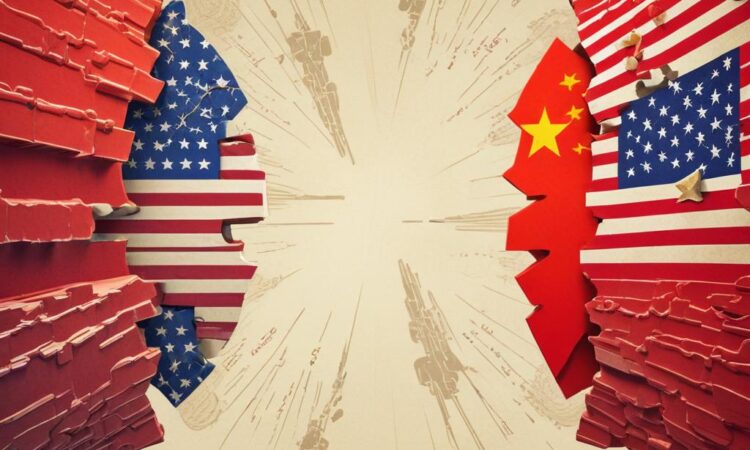China Challenges Trump Tariffs as ‘Discriminatory’
Beijing has issued a strong rebuke against the recently announced Trump administration tariffs, characterizing them as discriminatory and unjustified. The Chinese government contends that the US is leveraging unfounded accusations regarding China’s involvement in the fentanyl trade to provide a pretext for these new economic sanctions. This escalation in trade tensions marks a significant development in the already strained relationship between the two global superpowers.
The statement released by the Chinese Ministry of Commerce explicitly refutes the US claims, asserting that the evidence presented to support the allegations of Chinese complicity in the fentanyl crisis is weak and lacks credible substantiation. The ministry points to the extensive efforts undertaken by China to combat the illicit drug trade, highlighting successful seizures of precursor chemicals and the prosecution of individuals involved in drug trafficking. They argue that these actions demonstrate China’s commitment to international cooperation in addressing the global opioid crisis.
The new tariffs, which target a wide range of Chinese goods, are expected to significantly impact both Chinese exporters and American consumers. Analysts predict that the increased costs associated with these tariffs will lead to higher prices for various products in the US market, potentially fueling inflation. Moreover, the retaliatory measures anticipated from China could further disrupt global supply chains and exacerbate existing economic uncertainties.
The Trump administration’s justification for the tariffs centers on the assertion that China is not doing enough to curb the flow of fentanyl precursors into the US. The administration claims that these precursors are being used to manufacture fentanyl, a potent synthetic opioid responsible for countless overdose deaths in the United States. However, China’s response insists that the US has failed to provide conclusive evidence linking Chinese entities directly to the manufacturing and distribution of fentanyl within the US.
The dispute over the fentanyl trade has become a focal point in the broader trade war between the US and China. Both countries have accused each other of employing unfair trade practices, leading to a tit-for-tat imposition of tariffs and other trade restrictions. The current escalation suggests that a resolution to this protracted trade conflict remains elusive, with the potential for further economic repercussions for both nations.
Experts warn that the ongoing trade tensions could have far-reaching consequences beyond the economic sphere. The strained relationship between the US and China has the potential to destabilize global markets and undermine international cooperation on other critical issues, including climate change and global health security. The lack of trust and open communication between the two governments further complicates efforts to find a mutually acceptable solution to the trade dispute.
The Chinese government’s response underscores the deep-seated mistrust and diverging narratives surrounding the fentanyl crisis. Both sides present compelling arguments, but the lack of transparency and verifiable evidence hinders the ability to objectively assess the extent of China’s responsibility in the opioid crisis. Independent investigations and a collaborative approach are crucial to fostering mutual understanding and establishing a more constructive dialogue.
The economic impact of the tariffs extends beyond the immediate effects on Chinese exports and US imports. The uncertainty surrounding the future of US-China trade relations discourages investment and inhibits economic growth. Businesses are forced to adapt to unpredictable trade policies, leading to reduced efficiency and potentially job losses. The global economy, already grappling with various challenges, faces further instability due to this ongoing trade war.
International observers are urging both countries to engage in constructive dialogue and find a diplomatic solution to the trade dispute. Compromise and mutual respect are essential to de-escalate tensions and prevent further damage to the global economy. The failure to resolve this conflict peacefully could have severe consequences for global stability and international cooperation.
This ongoing trade war highlights the complexities of international relations and the challenges of addressing global issues such as the opioid crisis through unilateral actions. A collaborative approach, based on shared responsibility and transparency, is necessary to effectively tackle such complex problems. The alternative – continued escalation and economic warfare – poses significant risks to the global economy and international stability.
The accusations and counter-accusations regarding the fentanyl trade reflect the broader geopolitical tensions between the US and China. These tensions extend beyond economic issues and encompass ideological differences, strategic competition, and differing approaches to global governance. Addressing these underlying issues is crucial to achieving long-term stability in the US-China relationship.
The future trajectory of US-China relations remains uncertain. The outcome of this trade dispute will have a profound impact on the global economy and international order. The need for diplomatic solutions and collaborative efforts to manage these complex issues has never been more critical.
The situation underscores the need for a more nuanced and comprehensive understanding of the complexities of the fentanyl crisis, avoiding simplistic narratives and focusing on collaborative efforts to combat this global challenge effectively. Addressing the root causes of drug addiction and strengthening international cooperation are crucial for meaningful progress.
The ongoing conflict serves as a stark reminder of the interconnectedness of global economies and the significant consequences of escalating trade tensions. The need for a rules-based international trading system, underpinned by transparency and mutual respect, is paramount in mitigating future risks and ensuring sustainable economic growth.
The challenge lies in finding common ground and developing mechanisms for effective communication and dispute resolution. A sustained commitment to dialogue and a willingness to compromise are essential for achieving lasting peace and cooperation.

